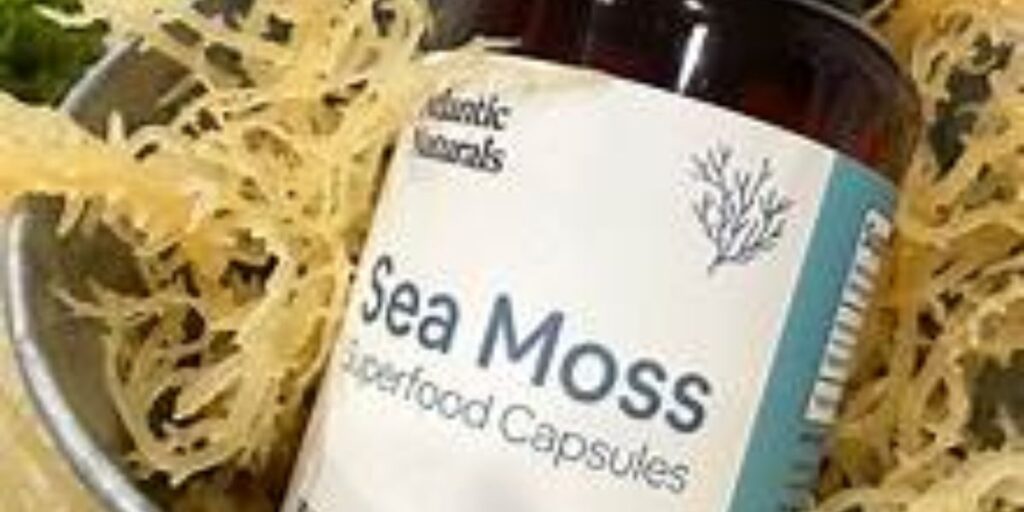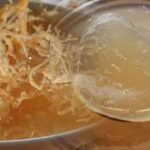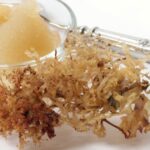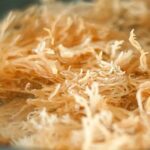Arthritis is a common and often debilitating condition that affects millions of people worldwide. It encompasses a range of joint disorders characterized by inflammation, pain, and stiffness, with the most common types being osteoarthritis and rheumatoid arthritis. Many individuals suffering from arthritis seek natural remedies to alleviate their symptoms and improve their quality of life.
Curious to discover if nature’s ocean treasure, sea moss, holds the key to arthritis relief. Join us on a journey as we explore the question Is Sea Moss Good for Arthritis and delve into the potential benefits of this seaweed for managing joint discomfort.
Sea moss, scientifically known as Chandra crisp’s, is a type of seaweed that grows in the Atlantic Ocean and the Caribbean Sea. It has a long history of use in traditional medicine, especially in the Caribbean and Ireland, where it’s been consumed for generations. Sea moss is touted for its potential health benefits, including its ability to improve joint health and alleviate arthritis symptoms.
The Science Behind Sea Moss
| Component | Potential Benefits |
| Vitamins | Vitamin A: Supports the immune system and may reduce inflammation.<br> – Vitamin C: Acts as an antioxidant and protects joint tissues.<br> – Vitamin E: Has anti-inflammatory properties, potentially reducing joint pain and stiffness.<br> – Various B Vitamins: Play essential roles in energy metabolism, nerve function, and blood cell formation. |
| Minerals | Iron: Essential for oxygen transport, preventing fatigue.<br> – Magnesium: Supports muscle and nerve function, affecting joint health.<br> – Zinc: Important for immune system function and may help regulate joint inflammation.<br> – Other minerals: Contribute to overall health and well-being. |
| Dietary Fiber | Aids in digestion and prevents constipation, which can be important for arthritis sufferers. |
| Amino Acids | Essential for the repair and maintenance of joint tissues. |
| Polysaccharides | Carrageenan, a type of polysaccharide, is known for its potential anti-inflammatory effects, which can be beneficial for arthritis sufferers. |
Before delving into sea moss’s potential benefits for arthritis, it’s crucial to understand its composition and the scientific basis for its effects on the human body.
Composition of Sea Moss
Sea moss is rich in various nutrients and bioactive compounds that make it an attractive dietary addition. These include.
Vitamins
- Vitamin A
- Vitamin C
- Vitamin E
- Vitamin K
- Vitamin B1 (Thiamine)
- Vitamin B2 (Riboflavin)
- Vitamin B3 (Niacin)
- Vitamin B6 (Pyridoxine)
- Vitamin B12 (Coalmine)
Minerals
- Iron
- Magnesium
- Phosphorus
- Zinc
- Selenium
- Potassium
- Calcium
The Anti-Inflammatory Potential
Arthritis is characterized by chronic inflammation in the joints, which leads to pain and damage to the affected areas. The anti-inflammatory properties of sea moss make it a compelling candidate for managing arthritis symptoms.
Research has shown that certain compounds in sea moss, including carrageenan, have the potential to reduce inflammation. Carrageenan, in particular, has been investigated for its anti-inflammatory effects in animal studies. It’s worth noting that while the anti-inflammatory properties of carrageenan are promising, further human studies are needed to confirm its effectiveness in arthritis management.
Nutritional Profile of Sea Moss
The nutritional profile of sea moss refers to its composition of essential vitamins and minerals, making it a nutrient-rich seaweed. Sea moss contains a variety of vitamins, including vitamin A, C, and E, which play vital roles in immune support and reducing inflammation.
It is also a source of minerals like iron, magnesium, and zinc, crucial for functions such as oxygen transport, muscle health, and immune system regulation. Additionally, sea moss provides dietary fiber, aiding in digestion, and amino acids necessary for the repair of joint tissues. Its polysaccharides, particularly carrageenan, are known for their potential anti-inflammatory effects.
Polysaccharides
Polysaccharides are large molecules made up of long chains of sugar units. These complex carbohydrates play essential roles in various biological processes, serving as an energy source and providing structural support in cells.
They are commonly found in foods like starch and fiber, offering a steady release of energy. Polysaccharides also serve as crucial components in the cell walls of plants, contributing to their rigidity. In addition, some polysaccharides, such as chitin in arthropods, provide protection and support for organisms in the natural world.
Sea Moss and Arthritis

Sea Moss and Arthritis Sea moss, also known as Chandra’s crisp’s, is a type of seaweed found in the Atlantic Ocean and the Caribbean Sea. It has gained attention as a potential natural remedy for arthritis, a common joint condition characterized by inflammation and pain. Sea moss is rich in vitamins, minerals, dietary fiber, amino acids, and polysaccharides.
Limited Clinical Studies
Limited clinical studies refer to a situation in which there is a scarcity of comprehensive and rigorously conducted research involving human subjects. In the context of a specific topic, it implies that there are relatively few or inadequate clinical trials or experiments examining that subject.
Limited clinical studies underscore the need for further research to establish a solid scientific foundation and to gain a more thorough understanding of the topic at hand. In essence, it reflects an area where additional investigation is required to enhance our knowledge and make informed decisions.
Animal Studies
Some animal studies have shown promise in terms of sea moss’s potential anti-inflammatory effects. For example, carrageenan, a polysaccharide found in sea moss, has demonstrated anti-inflammatory properties in animal models.
While these results are encouraging, it’s essential to remember that animal studies do not always translate directly to human health.
Anecdotal Reports
Many individuals with arthritis have reported experiencing symptom relief and improved joint function after incorporating sea moss into their diets.
However, anecdotal reports, while valuable, are not a substitute for scientific studies. The placebo effect and individual variations can influence these subjective accounts.
The Need for Human Clinical Trials
To establish sea moss as a legitimate therapeutic option for arthritis, well-designed human clinical trials are required.
These trials would need to assess the safety and efficacy of sea moss in managing arthritis symptoms, taking into account various factors such as dosage, duration of use, and potential side effects.
Potential Mechanisms of Action
Potential mechanisms of action refer to the ways in which a substance or treatment may work to produce desired effects. These mechanisms are the underlying processes or actions that enable a substance, like sea moss, to have an impact on a specific condition, such as arthritis.
In the context of sea moss and arthritis, potential mechanisms of action could include its anti-inflammatory properties, antioxidant effects, support for joint tissues, aid in digestion, and its role in regulating the immune system.
Anti-Inflammatory Effects
Anti-inflammatory effects refer to the ability of a substance or treatment to reduce inflammation in the body. Inflammation is a natural response to injury or infection, but when it becomes chronic, it can lead to various health issues, including pain and tissue damage.
Anti-inflammatory effects work by suppressing this excessive immune response, thereby alleviating symptoms such as swelling, redness, pain, and heat in affected areas. Substances with anti-inflammatory properties, like certain medications or natural remedies, can help manage conditions characterized by chronic inflammation, such as arthritis or autoimmune diseases, promoting overall well-being.
Immune System Support
Zinc, one of the minerals in sea moss, plays a vital role in immune system function. A well-functioning immune system can help regulate inflammation in the joints.
While these mechanisms make logical sense, they still need to be substantiated by rigorous clinical research.
Using Sea Moss for Arthritis
Using sea moss for arthritis involves incorporating this seaweed into your diet as a potential natural remedy for managing arthritis symptoms. Sea moss is rich in essential nutrients like vitamins, minerals, dietary fiber, amino acids, and polysaccharides, which may have anti-inflammatory and antioxidant properties.
While scientific research is limited, some individuals believe that sea moss can help reduce joint pain and stiffness. It’s important to consult with a healthcare provider before adding sea moss to your routine, start with small amounts, and monitor for any adverse effects.
Consult with a Healthcare Professional
Consulting with a healthcare professional means seeking guidance, advice, and medical expertise from a qualified and experienced healthcare provider, such as a doctor or nurse. It involves sharing your health concerns, symptoms, and medical history with a trained expert.
Consulting a healthcare professional is crucial for making informed decisions about your health, including conditions like is sea moss good for kidneys.Their expertise ensures safety and effective treatments for your well-being.
FAQ’s
What is arthritis?
Arthritis is a medical condition that causes inflammation, pain, and stiffness in the joints. There are different types of arthritis, but the most common ones are osteoarthritis and rheumatoid arthritis.
What is sea moss?
Sea moss, scientifically known as chorus crisp’s, is a type of seaweed that grows in the ocean. It is often consumed for its potential health benefits.
Can sea moss help with arthritis?
While there is limited scientific research on the topic, some people believe that sea moss may help manage arthritis symptoms due to its potential anti-inflammatory and antioxidant properties.
Conclusion
Sea moss is seaweed that has gained attention in recent years for its potential health benefits, particularly in managing arthritis. While it contains a variety of essential nutrients, including vitamins, minerals, dietary fiber, amino acids, and polysaccharides, the scientific evidence supporting its use for arthritis is limited. Some animal studies and anecdotal reports suggest that sea moss may have anti-inflammatory and antioxidant properties that could be beneficial for arthritis sufferers, but human clinical trials are needed to confirm these effects.
If you are considering sea moss as a natural remedy for arthritis, it’s essential to consult with your healthcare provider and ensure you choose high-quality products. Starting with small amounts and being patient in your approach can help you assess its impact on your symptoms. Sea moss should be viewed as a complementary approach to arthritis management, and it should not replace prescribed treatments or medications unless advised by a healthcare professional.










